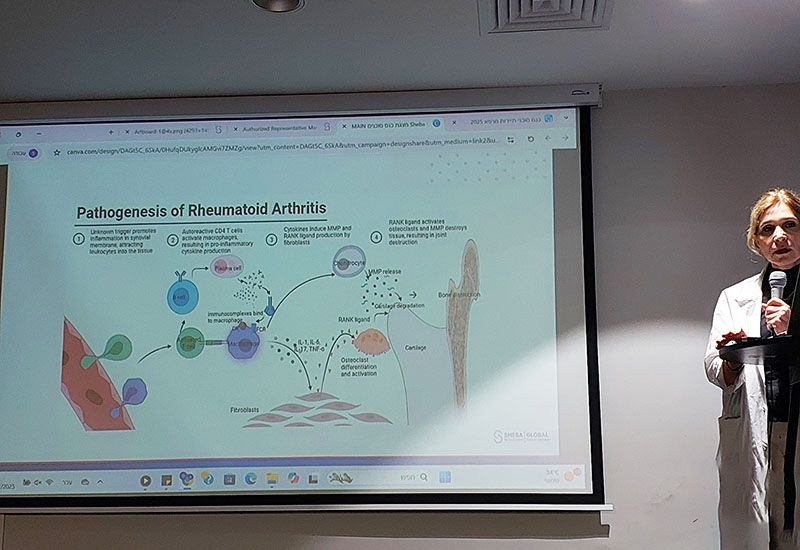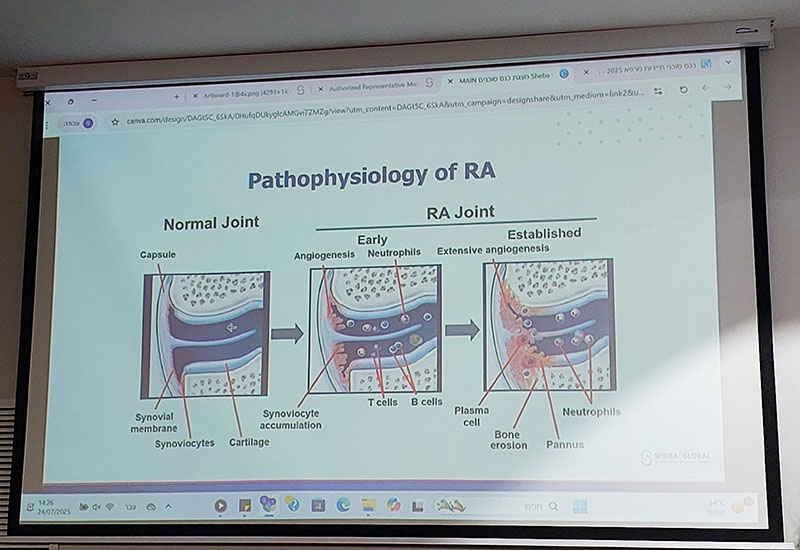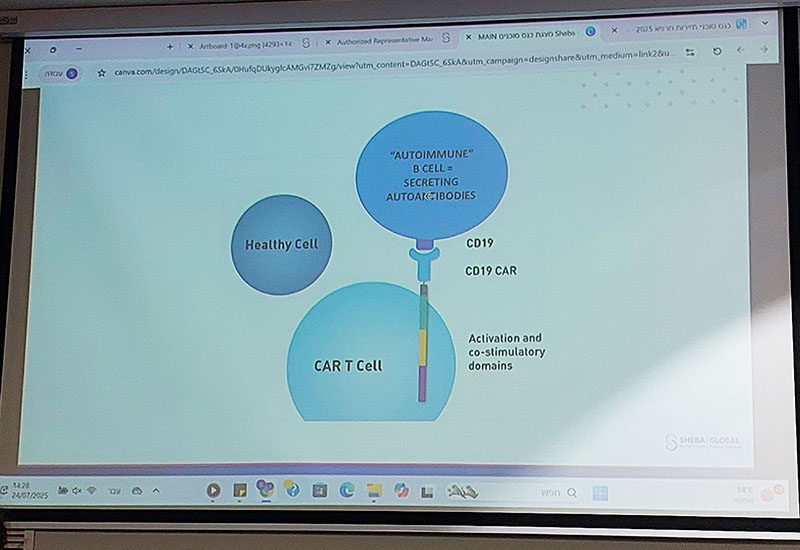Understanding Rheumatoid Arthritis
Rheumatoid Arthritis (RA) is a chronic autoimmune disease that causes the immune system to mistakenly attack the body’s own joints. This leads to inflammation, swelling, pain, and progressive joint damage, often affecting the hands, wrists, knees, ankles, and feet. Over time, RA can also impact other parts of the body, including the eyes, lungs, and blood vessels.
RA affects approximately 1% of the global population, with women being two to three times more likely to develop the disease than men. The onset typically occurs between the ages of 30 and 60, and the condition often progresses if left untreated or poorly managed.
Living with RA can be debilitating. Many patients experience chronic pain, stiffness, fatigue, and reduced mobility, which significantly impact their daily lives and mental health.

Prof. Lidar at a lecture about the CAR-T program
Traditional RA Treatments – Ongoing Challenges
Conventional treatment for RA focuses on reducing inflammation, slowing disease progression, and preserving joint function. Common therapies include:
- Non-steroidal anti-inflammatory drugs (NSAIDs)
- Corticosteroids
- Disease-modifying antirheumatic drugs (DMARDs) such as methotrexate
- Biologic therapies that target specific immune system pathways (e.g., TNF inhibitors)
While these treatments help many patients, they don’t work for everyone. Some individuals with refractory RA experience little to no improvement, or develop resistance over time. Others suffer from serious side effects due to long-term immunosuppression.
This has created a critical need for more effective and targeted therapies — especially for those who have exhausted standard treatment options.

CAR-T Therapy: A Breakthrough for Refractory RA
CAR-T cell therapy (Chimeric Antigen Receptor T-cell therapy) is an advanced form of personalized immunotherapy originally developed for treating cancers such as leukemia and lymphoma. Today, it is emerging as a promising option for autoimmune diseases — including refractory rheumatoid arthritis. In CAR-T therapy, a patient’s own T-cells are collected and genetically engineered in a lab to target and destroy specific immune cells (usually B-cells) that are contributing to the disease. The modified T-cells are then infused back into the patient, where they seek out and eliminate the harmful cells causing inflammation and joint damage.

Why CAR-T for Rheumatoid Arthritis?
B-cells play a central role in driving autoimmune inflammation in RA. Targeting these cells through CAR-T therapy offers a deeper, more precise approach compared to traditional medications.
Preliminary clinical studies have shown that CAR-T therapy can result in sustained remission, even in patients who had failed multiple conventional and biologic therapies. Some reported outcomes include:
- Significant reduction in joint swelling and pain
- Improved mobility and quality of life
- Lower dependence on corticosteroids
- Decreased markers of systemic inflammation
For patients with difficult-to-treat RA, CAR-T therapy may offer a transformative path forward.
CAR-T Clinical Program for RA at Sheba Medical Center, Israel
In Israel, Sheba Medical Center — consistently ranked among the top 10 hospitals in the world — is leading a clinical trial for CAR-T therapy in rheumatologic diseases, including rheumatoid arthritis.
This groundbreaking program is headed by Prof. Merav Lidar, Director of the Center for Autoimmune Diseases and Head of the Rheumatology Unit at Sheba. Prof. Lidar is internationally recognized for her work in autoimmune and inflammatory conditions, and leads one of the most advanced CAR-T therapy initiatives for non-cancer patients.
Patients from around the world may be eligible to apply to this program, pending clinical evaluation.
Who May Be Eligible for CAR-T Therapy for RA?
CAR-T therapy may be considered for RA patients who:
- Have moderate to severe disease with significant joint or systemic involvement
- Have not responded to multiple DMARDs and biologic agents
- Are in stable enough condition to undergo the CAR-T treatment protocol (typically 8–10 weeks in Israel)
Early Treatment Matters
In autoimmune diseases like RA, early intervention is key. The goal of CAR-T therapy is not only to reduce symptoms, but also to prevent long-term joint destruction and organ damage. Once irreversible damage has occurred, it cannot be undone — which makes timely treatment essential.
Start the Free Evaluation Process
If you or a loved one is living with rheumatoid arthritis and conventional treatments are no longer effective, CAR-T therapy in Israel may be a new and hopeful option.
Publication date: August 2025










